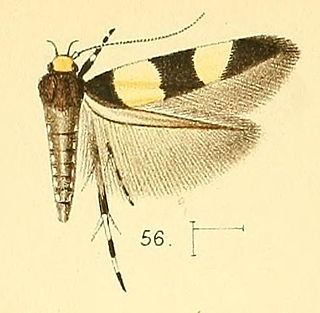The Cosmopterigidae are a family of insects in the order Lepidoptera. These are small moths with narrow wings whose tiny larvae feed internally on the leaves, seeds and stems of their host plants. About 1500 species are described. The taxonomic family is most diverse in the Australian and Pacific region with about 780 species.

Macrobathra is a genus of moths in the family Cosmopterigidae. Most species are endemic to Australia.

Achatia distincta, the distinct quaker, is a moth of the family Noctuidae. The species was first described by Jacob Hübner in 1813. It is found from coast to coast in most of United States and south-eastern Canada.

The Antequerinae are a subfamily of the Cosmopterigidae. In the Nearctic, the subfamily consists of eight species in four genera, found in North America and England.
Macrobathra alternatella is a moth in the family Cosmopterigidae. It was described by Francis Walker in 1864. It is found in Australia, where it has been recorded from Queensland.
Macrobathra brontodes is a moth in the family Cosmopterigidae. It was described by Edward Meyrick in 1886. It is found in Australia, where it has been recorded from Queensland.
Macrobathra crococephala is a moth in the family Cosmopterigidae. It was described by Edward Meyrick in 1936. It is found in the Democratic Republic of the Congo.
Macrobathra crococosma is a moth in the family Cosmopterigidae. It was described by Edward Meyrick in 1922. It is found in Australia, where it has been recorded from Queensland.
Macrobathra dasyplaca is a moth in the family Cosmopterigidae. It was described by Oswald Bertram Lower in 1894. It is found in Australia, where it has been recorded from Tasmania.
Macrobathra eudesma is a moth in the family Cosmopterigidae. It was described by Oswald Bertram Lower in 1900. It is found in Australia.
Macrobathra euryxantha is a moth in the family Cosmopterigidae. It was described by Edward Meyrick in 1886. It is found in Australia, where it has been recorded from Queensland.

Macrobathra fasciata is a moth in the family Cosmopterigidae. It was described by Walsingham in 1891. It is found in Namibia, South Africa, Gambia and Zimbabwe.
Macrobathra heterocera is a moth in the family Cosmopterigidae. It was described by Oswald Bertram Lower in 1894. It is found in Australia, where it has been recorded from Tasmania.
Macrobathra mesopora is a moth in the family Cosmopterigidae. It was described by Edward Meyrick in 1886. The adult moths have off-white forewings with bold dark brown bands and patches. The hindwings are dark brown. The wingspan is about 1.5 cm. It is found in Australia, where it has been recorded from New South Wales.
Macrobathra notozyga is a moth in the family Cosmopterigidae. It was described by Edward Meyrick in 1914. It is found in Australia, where it has been recorded from Queensland.
Macrobathra quercea is a moth in the family Cosmopterigidae. It was described by Sigeru Moriuti in 1973. It is found in Japan and China.
Macrobathra recrepans is a moth in the family Cosmopterigidae. It was described by Edward Meyrick in 1926. It is found in South Africa and Zimbabwe.
Macrobathra sarcoleuca is a moth in the family Cosmopterigidae. It was described by Edward Meyrick in 1915. It is found in Australia, where it has been recorded from Queensland.
Macrobathra stenosema is a moth in the family Cosmopterigidae. It was described by Alfred Jefferis Turner in 1932. It is found in northern Australia.
Macrobathra trithyra is a moth in the family Cosmopterigidae. It was described by Edward Meyrick in 1886. It is found in Australia, where it has been recorded from South Australia.




